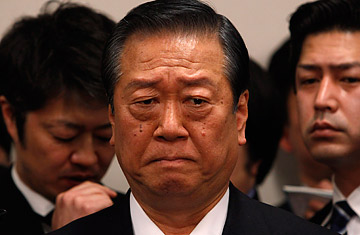
Ichiro Ozawa, former head of the Democratic Party of Japan, at a news conference in Tokyo on Jan. 31, 2011, the day he was charged with funding violations
As an erupting volcano and record snowfalls radically alter Japan's physical terrain this week, the nation's political landscape appears stubbornly unchanged. Even the unprecedented indictment of Ichiro Ozawa, the influential former head of the ruling Democratic Party of Japan (DPJ), could be just another storm that will pass. Or will it?
Ozawa was charged on Monday with political-funding violations stemming from the 2004 purchase of a $4.1 million property in Tokyo. The charges come a mere five months after his campaign against Naoto Kan as Japan's Prime Minister — a bid that he lost by only six votes.
The 68-year-old DPJ co-founder and oft-called "shadow shogun" has asserted his innocence since the investigation into the purchase started heating up in 2009. "As I have said repeatedly at various occasions, I myself have done nothing shameful," Ozawa stated confidently at a press conference on Monday. "I will continue to do my utmost as a DPJ lawmaker to carry out politics that place top priority on the lives of the people."
If found guilty, Ozawa could face up to five years in prison and a $12,200 fine. But that's a long shot: prosecutors have already decided twice not to indict Ozawa after failing to collect sufficient evidence to prove that the party funds were misreported. Instead they charged three of his aides, whose trials will begin on Feb. 7. Ozawa's indictment was not unexpected, but the process has been highly unusual. The new charge was filed by court-appointed lawyers after a review panel of 11 citizens, set up in accordance with Japanese law, overruled the prosecutors' decisions. During the trial the lawyers will be the prosecution.
"This is wonderful kabuki," says Jesper Kroll, managing director at JPMorgan Securities Japan and a longtime commentator on Japanese politics. "The danger for the [DPJ] is that they could lose their principal politician. [Ozawa] is one of the most Machiavellian politicians of Japan's postwar era." Ozawa is credited as the architect of the DPJ's historic 2009 win that ended the Liberal Democratic Party's nearly continuous 50-year reign. He also has the largest group of followers in the DPJ, many of whom are young lawmakers he has mentored for generations.
His indictment, however, could damage his party's approval rating, now just 29%, and further weaken the beleaguered Kan. For Kan, the battlefield for his political career includes Japan's chronic debt and inflation as well as the persistent threats from within his party, including from Ozawa, to unseat him only seven months after his election. If he is unable to pass the fiscal 2011 budget in March, experts say he will have little choice but to resign. A leadership election would follow as early as the spring.
Will Ozawa feel obligated to resign from the DPJ as Kan must hope he will? "Highly unlikely," says Koichi Nakano, a political-science professor at Sophia University in Tokyo. "Ozawa thinks his name is going to be cleared through the court process," and, he adds, "a forced resignation would not be good for the Kan administration."
Still, Ozawa has been widely criticized for his outspoken views, including his unyielding stance against the American military presence in Okinawa, a view that is out of step with Japan's foreign policy with the U.S. "From the beginning, he was a threat to the status quo," says Karel van Wolferen, a longtime Japan political insider and author of the forthcoming book Who Is Trying to Kill Ozawa Ichiro? "I cannot think of a case anywhere else where a politician has been hounded to this extent and for so long."
Much of Ozawa's political future will depend on how his loyalists respond to the criminal trial, which might take years. "It could be an act of political suicide if they were to follow Ozawa into the political wilderness when he is still fighting a court case and unable to engage in party realignment," says Nakano.
As the country's revolving Prime Ministers — Kan is the sixth in five years — have proved, weak leadership dominates Japanese politics. Some have argued that Ozawa might be the sacrificial lamb that could save Kan by making it appear he's cleaning up the party and give him a stronger grip on government. But others argue that Japan's lack of clear leadership runs deeper than that. "Ozawa's indictment is not going to solve the gridlock in parliament," says Kroll.
Not so long ago, it looked like Ozawa could have been the one to reform Japan's social-welfare system, get the country out of its two decades of low growth and even develop more independence from the U.S. But since his indictment, the curtain appears to be closing on his career. "Even though he was a big shot in the past, he is now just one of the party members," says Takao Toshikawa, a political analyst with the website Tokyo Insideline. "Ozawa is disappearing from the main stage of the political drama in this country, little by little."
The political kingpin, though, has made some remarkable comebacks in his long career, most recently in 2009 when he was appointed DPJ secretary general after resigning as party head over the ensuing political-funding scandal. His so-called unpopularity with the general public is also a matter of debate. Van Wolferen says Ozawa still has widespread support among voters: "There has been a significant grass-roots protest against Ozawa's treatment ... which is not being covered by the media."
Either way, the future of the shadow shogun's political career seems bound to the multiparty nation he helped create decades ago. "How Ozawa's indictment develops will determine the fate of the DPJ," says van Wolferen. "And with it, the timing of Japan gaining a genuine political steering wheel that will get it out of the business-as-usual absence of policymaking for which it is internationally known."
